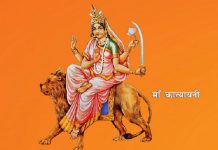
Basant Panchami (the fifth day of spring) presents the magnificence and grandeur of Spring. It is a Hindu festival, celebrating the arrival of Spring. The festival is attributed to Goddess Saraswati, the Goddess of knowledge, music, arts, wisdom and learning. The day is considered as Goddess Saraswati’s birthday, hence Goddess Saraswati is worshipped.
Goddess Saraswati is a part of the trinity (Tridevi) of Saraswati, Lakshmi and Parvati. All the three forms help the trinity of Brahma, Vishnu and Shiva to create, maintain and regenerate the Universe respectively.
In the Rigveda, it is the earliest known mention of Saraswati as a goddess. She has remained significant as a goddess from the Vedic period through modern times of Hindu traditions. Basant Panchami in India is celebrated in her honour and the day is marked by helping young children learn how to write alphabets. The word Saraswati appears both as a reference to a river and as a significant deity in the Rigveda. The word refers to Sarasvati River in the initial passages and mentioned with other Northwest Indian rivers such as Drishadvati. Saraswati then connotes a river deity. In Book two, Rigveda calls Saraswati as the best of mothers, of rivers and of goddesses. In hymns of Book 10 of Rigveda, she is already declared to be the “possessor of knowledge”.
Goddess Saraswati is generally shown seated on a white lotus, wearing a pure white silk sari and holding a book in her lower left hand. The eyes of the goddess are full of compassion. Her four hands denote the four facets of human personality namely mind, intellect, alertness and ego. The lotus on her hand symbolises true knowledge. Her ride is a white swan which is known for its peculiar capability of separating water from the milk. The swan indicates that we should have the ability to discriminate the bad from the good.
During the Saraswati Puja festivities, the devotees visit temples which are filled with various types of religious activities. Yellow colour on Basant Panchami is given prominence on this day and people dress up in yellow garments and perform rituals. Yellow represents spiritual knowledge, increasing the significance of the festival. People eat yellow sweets during the Sarasawati Puja celebrations and distribute the same among friends and relatives. People feed Brahmans on this occasion and also perform Pitra-Tarpan, the traditional ancestral worship. Basant Panchami is the day when children are taught their first words, making it an auspicious occasion which marks the beginning of their learning process. On this day, schools and colleges organise special worships in the name of the goddess. Traditionally, children place their books on the altar, at the goddess’s feet, as it is a blessing.
The festival bears spiritual significance like all other Hindu festivals. Goddess Saraswati and the arrival of spring signifies the end of the days of gloom and awakening into the new joy. The occasion also symbolises the end of the days of ignorance and awakening into spiritual enlightenment.







































